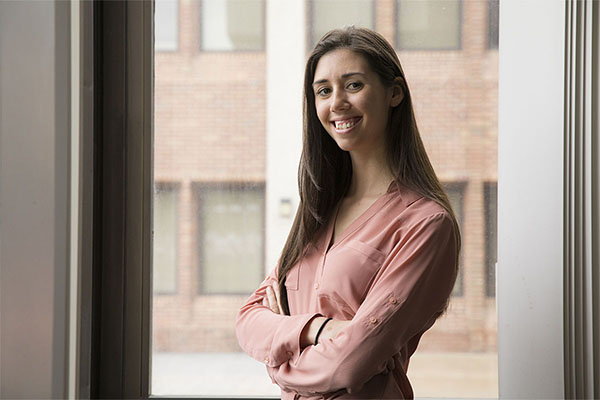
Young researcher focuses on trauma, recovery
While some people dive into their work, one Binghamton undergraduate lived with hers.
Rachael Shaw received a prestigious National Science Foundation grant to live with a veteran suffering from post-traumatic stress disorder in Syracuse last summer.
“It was such an amazing project,” says Shaw, who graduated in May with a bachelor’s degree in psychology and human development. “Too often I think researchers are separate from the population they are studying. It was great to hear the perspective of the veterans and to collaborate with them.”
The NSF funds intensive summer programs where students live at other universities to conduct research. Shaw was with four other students and five veterans, and says that her roommate was one of the strongest people she’s ever met. Shaw says the veteran, who is in her late 20s, had been on tour for about six years and has faced a multitude of hardships not obvious to others.
“Due to sandstorms, the air quality is deemed unlivable in some of the countries our veterans are deployed,” Shaw says. On top of the trauma caused by war itself, there is a whole different struggle of being a woman in the military, she says.
Shaw’s project focuses on attachment and the effect of social support on veterans who have PTSD. “Everyone always makes fun of me because I pick the dark stuff, but I’m really interested in trauma and human resilience,” she says.
Shaw, who grew up in North Babylon, N.Y., studied in two research labs at Binghamton. She works in a sex and gender lab under the supervision of Ann Merriwether, lecturer in psychology and human development, and Sean Massey, associate professor in women, gender and sexuality studies. She also worked in the Couples Adjustment to Stress and Trauma Lab under the supervision of Christina Balderrama-Durbin, assistant professor in psychology.
In the sex and gender lab, Shaw says, she had a lot of freedom to explore her interests and pick her own research topic. Her honors thesis focuses on intoxicated hookups and confidence in consent.
“It’s really interesting to look at consent on a scale because most studies on consent have a black-or-white answer,” Shaw says. “But there is a gray area. Only about 21 percent of people were absolutely confident that they gave consent in their last hookup in which alcohol was involved. A lot of people fall in the 2 to 5 range on a scale from 1 to 7.”
Shaw became interested in trauma when she interned for the Interpersonal Violence Prevention Program during her first year at Binghamton. She was an educator on campus about sexual assault and bystander intervention, as well as serving as an advocate for those who were sexually assaulted. Later she interned at Rise – Comprehensive Domestic Violence Services, in Endicott, N.Y.
Shaw plans to pursue a doctorate in clinical psychology at the University at Buffalo, where she will study alcohol and PTSD.
“My goal for the future is to understand how we foster resilience,” Shaw says. “Some people have the ability to overcome such intense trauma and it motivates me to want to help others do the same.”







